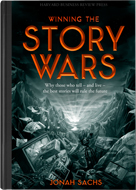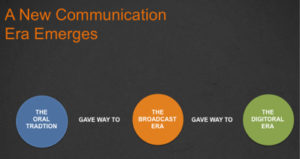Have we returned to the oral tradition of story?
Jonah Sachs thinks so.
In his new (June) book, Winning the Story Wars, and his session at Reinvention Summit 2, Jonah conveyed the belief that “the oral tradition which dominated human experience for all but the last few hundred years is returning with a vengeance.”
To those who ask, “With multimedia texts and IMs and Facebook Status Updates aren’t we relying on oral communication far less than ever?”, Jonah replies yes; that why he calls the emerging milieu the Digitoral Era.
As you can see on the slide at left, the immediate antecedent to the Digitoral Era is the Broadcast Era, in which “information begins life in the mind of its creator but quickly makes the jump into a machine that relatively few people have access to — letterpresses, radio transmitters, TV cameras.” In the Broadcast tradition, information “becomes clearly owned by the individuals who created and published it,” and “audiences don’t interpret it, mash it up and retell it. They never take ownership of it themselves. They consume it …”
In the oral tradition, though, “ideas also begin in the mind of a creator, but” … they “must replicate themselves, passing from the mind of one listener to the next.”
When the oral tradition meets the current digital landscape, “ideas today are never fixed; they’re owned and modified by everyone.”
Implications abound for marketers who want to seize the power of the Digitoral Era, a return to true myth-making. Jonah prescribes a particular story structure in which story is a container for how the world works, and the moral of the story hides the core values of storyteller. Stories embody perfection, truth, wholeness, simplicity, uniqueness, and justice. They provide meaning. Heroes and mentors play significant roles.
Indeed…
The stories that will succeed in the Digitoral Era will be held to the same survival-of‐the‐fittest standards all oral tradition stories have faced. They will be bruised and battered in transmission so their core message must be powerful, resonant and resilient. Stories that will prevail in the Story Wars won’t just entertain — they will matter.
I wish I could see the table of contents for Winning the Story Wars — the publisher does not seem to have provided “Look Inside” content to Amazon — so I could see more of Jonah’s suggestions for how to craft “stories that prevail.” But here are a few more resources about the Digitorial Era, including a slideshow that looks like an earlier version of why the author presented at Reinvention Summit 2.
The Producer Behind “Story Of Stuff” On How Marketers Can Build Real Connections
Winning the Story Wars with Freaks, Cheats, and Familiars
Jonah also shares some resonant quotes when he presents and in his book:
- Just ask yourself what information has survived intact from cultures steeped in oral traditions. The answer, of course, is stories.
- Worthwhile ideas that have been deftly encoded in compelling stories have survived with their meaning intact.
- Stories rule the tangled bank of the oral tradition and great stories, well-told will rule the wilds of the media marketplace now emerging.
Finally, because I am fascinated with how people define “story” and have collected a number of definitions through my Q&A series, here is Jonah’s:
… stories are a particular type of human communication designed to persuade an audience of a storyteller’s worldview. The storyteller does this by placing characters, real or fictional, onto a stage and showing what happens to these characters over a period of time. Each character pursues some type of goal in accordance with his or her values, facing difficulty along the way and either succeeds or fails according to the storyteller’s view of how the world works.

